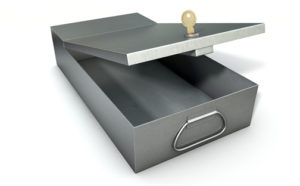
In today’s digital age, a physical safe deposit box may be considered a relic, but don’t be too hasty to dismiss the importance of keeping certain valuables securely tucked away in your bank’s vault, Bob Niedt writes in Kiplinger. “A safe deposit box can offer critical protection for important documents and prize possessions.”
But a safe deposit box isn’t a wise choice for everything, the author cautions. Some things Niedt recommends not keeping at the bank include:
- Cash – The bank might be closed when you need to access the money and it will not be insured by FDIC
- Your passport – you might need it for an emergency trip
- Original copy of your will (your executor might need to access it)
- Letter of instruction about burial services
- Durable power of attorney
- Living will and healthcare proxy
- Uninsured jewelry, rare coins and collectibles – the bank doesn’t insure them
- Spare house keys
At Rebecca W. Geyer & Associates, clients may request that we keep their documents. In that event, the originals are stored in a fireproof area, with electronic copies backed up every 15 minutes.
http://hoosierestateplanner.blogspot.com/search?q=copies+of+documents
So, what things ARE good to keep in a safety deposit box? Claes Bell of Bankrate.com lists several:
- Property deeds
- Savings bond certificates
- Car titles
- Videos of belongings in your home for insurance purposes
- Family heirlooms
- Precious photosSafebee.com adds two important items to the list:
1. Originals of birth certificate and marriage license
2. An inventory of your household possessions
At Geyer Law, where our attorneys handle “both ends” of the process – estate planning and estate administration, we understand the importance of organization in reducing heartache and conflict. The objective – replacing confusion with peace of mind. Sometimes, a safety deposit box has a role to play in both the planning and the settlement side of an estate.
– by Ronnie of the Rebecca W. Geyer & Associates blog team

